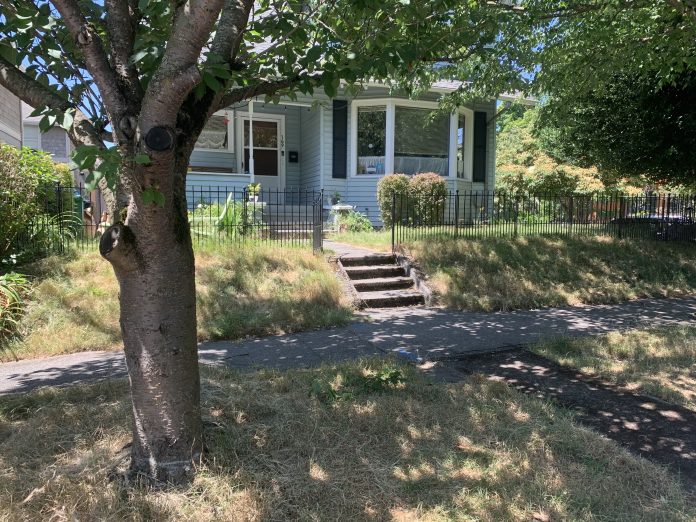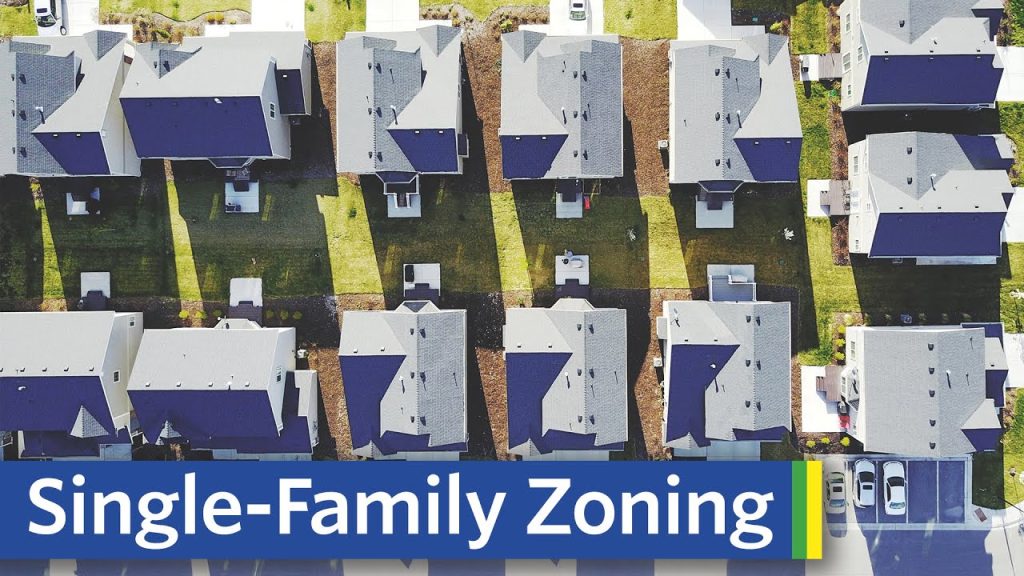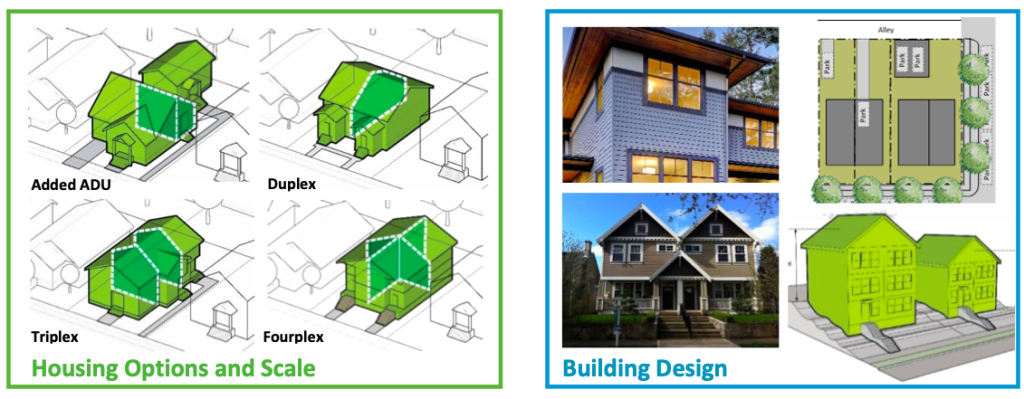
A proposed name change could kick off the fight to end exclusionary zoning in Seattle.
So, what’s exactly in a name? Juliet Capulet pondered this question of Romeo Montague in Shakespeare’s Romeo & Juliet. In the case of “single-family” zoning, the name brings to mind an image of detached residential buildings, each on an individual lot with a single nuclear family living inside.
But how accurate is that picture? And, more importantly, against the backdrop of a climate crisis, skyrocketing housing prices, and growing recognition of race-based inequities, does “single-family” zoning represent what we want our 21st century cities to look like?
Seattle City Councilmember Teresa Mosqueda argues the term “single-family” zoning has always been a bit of a misnomer in a city where many desirable single-family zoned neighborhoods, like Wallingford and upper Queen Anne, include courtyard apartments, cornerstores, and other relics of the city’s early years. More restrictive zoning regulations were layered on top starting with the 1923 zoning plan that progressively stifled further development of mixed-use neighborhoods.
But the problem with single-family zoning goes deeper than being misrepresentative. Zoning decisions have real impacts on how cities grow, and single-family zoning has never been a neutral planning tool. It came into fashion alongside financial redlining and racist covenants that excluded people of color and lower-income households from living in large segments of American cities, including Seattle. Because single-family zoning was aimed at keeping out more affordable, multifamily housing as well as the neighborhood businesses that make it possible to live without access to a vehicle, many housing affordability advocates have taken to using the term “exclusionary” zoning in lieu of “single-family” zoning in order to highlight its real purpose and impact.

“Changing the zoning title can help reflect the diverse housing we need across our city to support community well-being, walkability and affordability in Seattle, and create a more equitable and inclusive Seattle to accurately reflect our diverse neighborhoods,” said Mosqueda in a press release that states her intent to formally introduce legislation for the name change in August as part of the annual Comprehensive Plan update.
Mosqueda’s proposal, co-sponsored by Councilmember Dan Strauss (District 6), comes at a time in which the preponderance of single-family zoned land in Seattle is increasingly coming under scrutiny. While the topic of abolishing single-family zoning in Seattle has long been a thorny one, with many neighborhood groups opposing pro-density housing policies such as Mandatory Housing Affordability (MHA) and backyard cottage reform, the tide seems to be turning as more local leaders express support for ending exclusionary zoning practices. At a recent Seattle mayoral forum sponsored by Seattle Subway, five out of seven candidates came out against single-family zoning. Additionally, at-large city council candidates Nikkita Oliver and Brianna Thomas have made ending exclusionary zoning part of their affordable housing platforms.
But what would a name change achieve?
“Language matters. ‘Single family’ zoning may seem to some as merely a planning term, but we know historically it has been used to further exclusionary practices and discriminatory policies of the past,” Mosqueda said. “If Seattle is going to be an equitable and just city, then we must also apply that same lens to our zoning code. After years of discussion, we are acting on what we know is right to undo the legacy of exclusion that exists within our planning documents — starting with how we talk about our neighborhoods.”
However, others have been less than convinced that the proposed name change goes beyond a symbolic gesture. “How exactly does changing the *name* of the zoning fix the *exclusionary nature* of the zoning? Are you actually changing the zoning policy?” asked C. Gidds in a response on Twitter.
“That which we call a rose by any other name would smell as sweet,”
Juliet Capulet in Shakespeare’s Romeo & Juliet
“Really was hoping that name change was more reflective of the current zoning; ‘sprawl induction’, ‘low efficiency’, ‘one plex exclusive’ zones or something,” tweeted Char Q.
Timing, however, may be crucial to the impact of a zoning name change. Seattle is in the process of preparing for a new city Comprehensive Plan, one that should be completed by 2024 and that will guide the next decade or more of the city’s growth. During the next two years, city agencies will undertake work that sets the stage for what the Comprehensive Plan will become. That’s one of the reasons why Mosqueda has been pushing for the City to release the results of a racial equity analysis of Seattle’s urban village growth strategy — a strategy which allows for residential density in designated urban centers and villages, but places greater restrictions on density outside of those zones. Along with the highlighting race and equity impacts of the current housing strategy, supporters argue that removing the term “single-family” zoning may represent a step forward in a process that eventually leads to undoing exclusionary zoning practices in Seattle.
“It is an important change that will serve as a foundation to inform the policy process considering alternatives to single-family zoning which will make it possible for the city to consider expanding the range and affordability of housing choices,” said Patience Malaba, Director of Government Relations and Policy at Housing Development Consortium of Seattle-King County, in a statement.
Even abolishing single-family zoning might not be enough on its own
While critics point out that merely changing the zoning name will achieve nothing, evidence indicates that even abolishing single-family zoning in Seattle on its own might not succeed in fostering greater residential density and affordability. When seeking to increase housing choices and affordability, additional factors such as parking requirements and building and lot sizes need to be taken into account as well.
In 2018, Minneapolis made big waves by allowing for triplexes to be built in all city neighborhoods, a move that was supposed to effectively abolish single-family zoning in the city. However, height and density limits were left intact — meaning that new multifamily buildings would need to fit into the same size limits as pre-existing single-family dwellings. Since Minneapolis has a lot of relatively small residential lots, the new rules make construction of triplexes impractical in many instances, leading Strong Towns to question, “What if they passed zoning reforms, and nobody came?”

Portland may see mixed success in its zoning reform efforts as well. While its Residential Infill Project makes it easier to build duplexes, triplexes, and quadplexes in residential areas, critics fear that building size restrictions on formerly single-family zoned lots will stymy new residential development. The policy goal was to facilitate the creation of more housing units by making them smaller, and also by including density bonuses for affordable units. But, due to decreased floor area ratio (FAR) requirements, the new multiplexes will need to fit into smaller buildings than allowed under the previous size restrictions for single-family dwellings, calling into question if new development will be cost-effective for developers and desirable for future residents.
For readers who wish to learn more and potentially weigh in on the proposed single-family zoning name change, more information can be found Land Use and Neighborhoods Committee website. A public hearing to receive input on the preliminary proposal will be held on Wednesday, July 28th at 9:30am.
Natalie Bicknell Argerious (she/her) is a reporter and podcast host at The Urbanist. She previously served as managing editor. A passionate urban explorer since childhood, she loves learning how to make cities more inclusive, vibrant, and environmentally resilient. You can often find her wandering around Seattle's Central District and Capitol Hill with her dogs and cat. Email her at natalie [at] theurbanist [dot] org.

